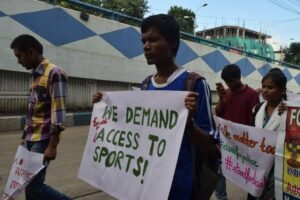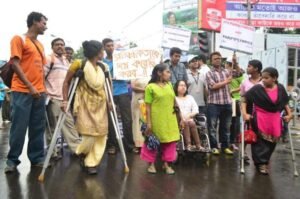Highlights:
– Saheb Hussain is an athlete with visual impairment who has the national record for 100m in his category.
– Paralympics is not about only sports, it is a movement historically rooted in ensuring disability rights.
– While the competitive part of the game brings in skills, finesse and passion, the rights-based approach ensures equity, equality and justice for the persons with disabilities.
“I didn’t receive a phone call in the last 6 months from the state body, leave alone support,” Saheb’s eyes were full of agony when he was uttering each word.
“They didn’t even ask whether I am alive! It feels terrible that for the state, and for the country for which we are doing so much, those people do not care for us.”
Saheb Hussain is an athlete with visual impairment who has the national record for 100m in his category. Such is the state of paralympics in India.
“There has already been a set of exclusive barriers for persons with disabilities. And now in the pandemic situation there is depression, social isolation, disability-specific challenges and let’s not forget that a significant part of the disabled population in India comes from a very humble background. With all the lockdown there has been a financial crisis, people who are trying to make ends meet, it is an added challenge”, adds Anusheela Brahmachary, a sports psychologist who has been working with athletes with disabilities to determine their coping strategies during pandemic.

Paralympics is not about only sports, it is a movement historically rooted in ensuring disability rights. While the competitive part of the game brings in skills, finesse and passion, the rights-based approach ensures equity, equality and justice for the persons with disabilities. A Sunday webinar by the Civilian Welfare Foundation hence tried to amalgamate voices from different vantage points in Indian Paralympics. The event was organised to remember Walk for Paralympics , the only walk for adapted sports in the world which happens every year from 2012 at Kolkata on the 28th of August but was skipped this year due to pandemic.
While there was Saheb Hussain representing proletariat athletes, there was Padmini Chennapragada, a disability sport consultant who has been recently been on limelight when she talked against the country’s highest paralympic body, Paralympic Committee of India (PCI). The panel also had Sports Journalist Prasad Subramanium known to track Mariyappan Thangavelu even before he won the Paralympic gold in Rio in 2016 and Anusheela Brahmachary, sports psychologist and disability sports researcher working on establishing sports as a tool for psycho-social empowerment in India.
Saheb mentioned how it was difficult for him to actually sit back at home day after day without any practice, he couldn’t even sleep due to depression. Then Super Cyclone Amphan wrecked his house and made the conditions even worse. He lamented that he would need at least a year to recuperate to return to proper shape for international competitions.
Padmini tried to deconstruct the situation in terms of policy. She said the national sports development code of India 2011 mandates you to have district-level organisations, coming together to form state-level organisations, and those state-level organisations getting affiliated to the national body. What we have in India for the paralympic community which is called the Paralympic Committee for India did not have working-level state units, we don’t have working-level district organisations, in case of a situation like cyclone or a pandemic there is no paperwork, there is no record keeping. She added how paralympics is exclusionary for disability rights in India be it for access, proper information system or following Rights for Persons with Disabilities Act (RPWD) 2016 or United National Convention for Rights of Person with Disabilities (UNCRPD).

She came out quite boldly in mentioning that there is a huge gap between information which comes out of the Sports Ministry and what the Paralympic Committee of India tries to show. She continued highlighting the fact that para-athletes who have/had an access to the power-lobbies in PCI are mostly playing competitive sports, others have to go round and round the circles to be in the limelight. She also pointed out the digital divide among athletes and how the para-sport bodies are reluctant to change this divide during this pandemic.
Ranjit Kumar was a para-athlete for 13 years and a para-coach with several medals including international medals yet he couldn’t get a confirmed Government job. Prasad, Sports journalist quotes Abhinava Bindra, an Olympian while sharing this story that “the country is producing champions not because of the system but despite the system”. He mentioned as a media guy, someone who reports, his job is to bring the stories out, his job is to not see whether he is an abled athlete or whether he is an athlete with disabilities. Even the last man in the race deserves support.
PIC
While Padmini pointed out that Pandemic or No Pandemic para-sports and para-sportspersons are in misery, Anusheela had a very interesting observation from her recent research during pandemic. When asked how (the athletes) are participating in doing something so altruistic like relief work during Covid 19 or Super cyclone Amphan? they said we thought that we are better off than many other people, and hence it is our social responsibility to give it back to the people who are not being able to cope. Sports have already helped them transcend their disabled identity. So this is something they are seeing as another challenging situation they can transcend with their motivation, self-confidence, self-esteem and the self believe that they have for themselves!
In a nutshell, while the missing disability rights perspective, accessibility issues, power lobbies in sports bodies, inadequate reporting poses a constant threat for structured development in Paralympics or Adapted sports in India, Pandemic doubled the miseries due to lack of proper grass-root network, resources and the growing digital divide. Still, as Saheb puts it echoing Anusheela’s research that I at least have food in my home, many others don’t, that was my inspiration for helping them out, this was what Paralympics have taught me!


I just desired to share with everyone here that We have come across some truly amazing insights and discussions on this forum. The amount of engagement and knowledge sharing is just outstanding!
I will be genuinely impressed by the thoughtful responses therefore the sense of community here. It is truly inspiring to become a part of such an exciting platform where ideas flow freely and most people are so supportive.
Many thanks to all the contributors in making this forum such a very important resource. Let us continue to learn from each other and grow together. Here’s to many more insightful conversations ahead!
Go ahead and customize it to match the precise context associated with the forum you might be posting on!
AD:
オーデマピゲミレãƒãƒªãƒ¼ コピー代引ã
ãƒã‚¨ãƒ™ãƒˆãƒ¼ãƒˆãƒãƒƒã‚°å½ç‰©
モンクレールé´Nç´š 代引ã
フィアオブゴッドæœå½ç‰©
グッãƒãƒãƒƒã‚¯ãƒ¬ã‚¹ コピー代引ã
Cool + for the post
_________________
жанартау онлайн-казинолық ставкаларсы